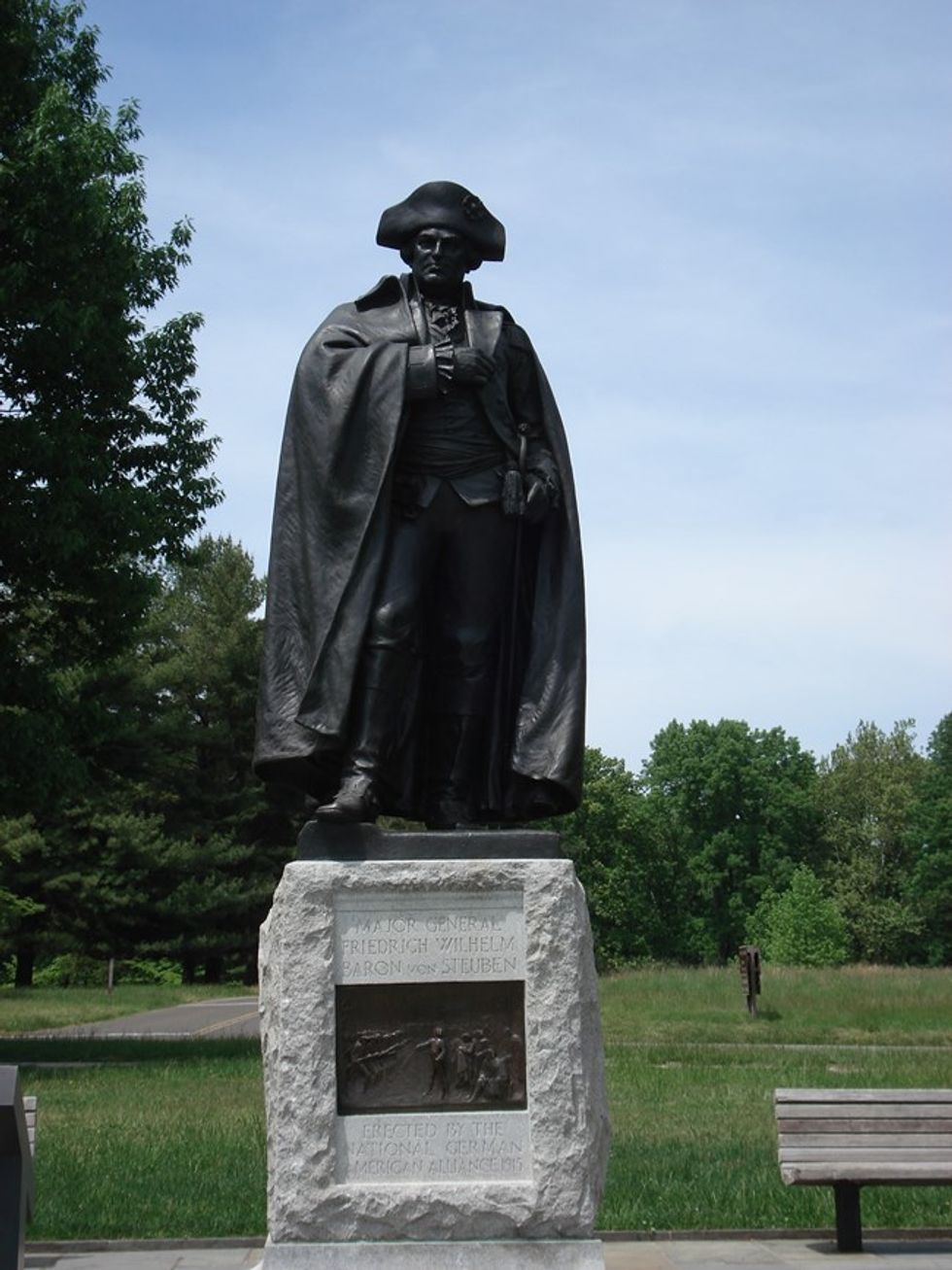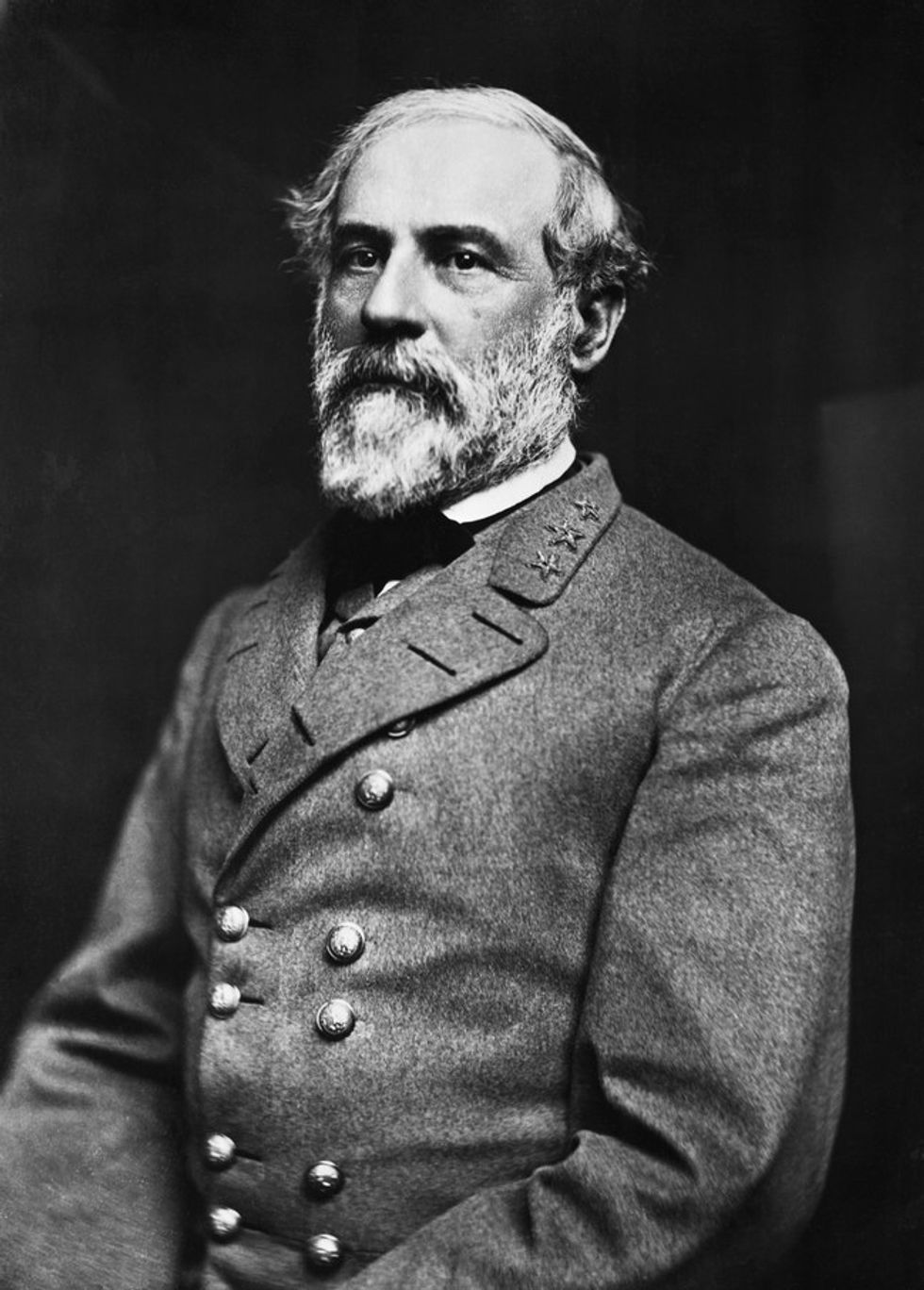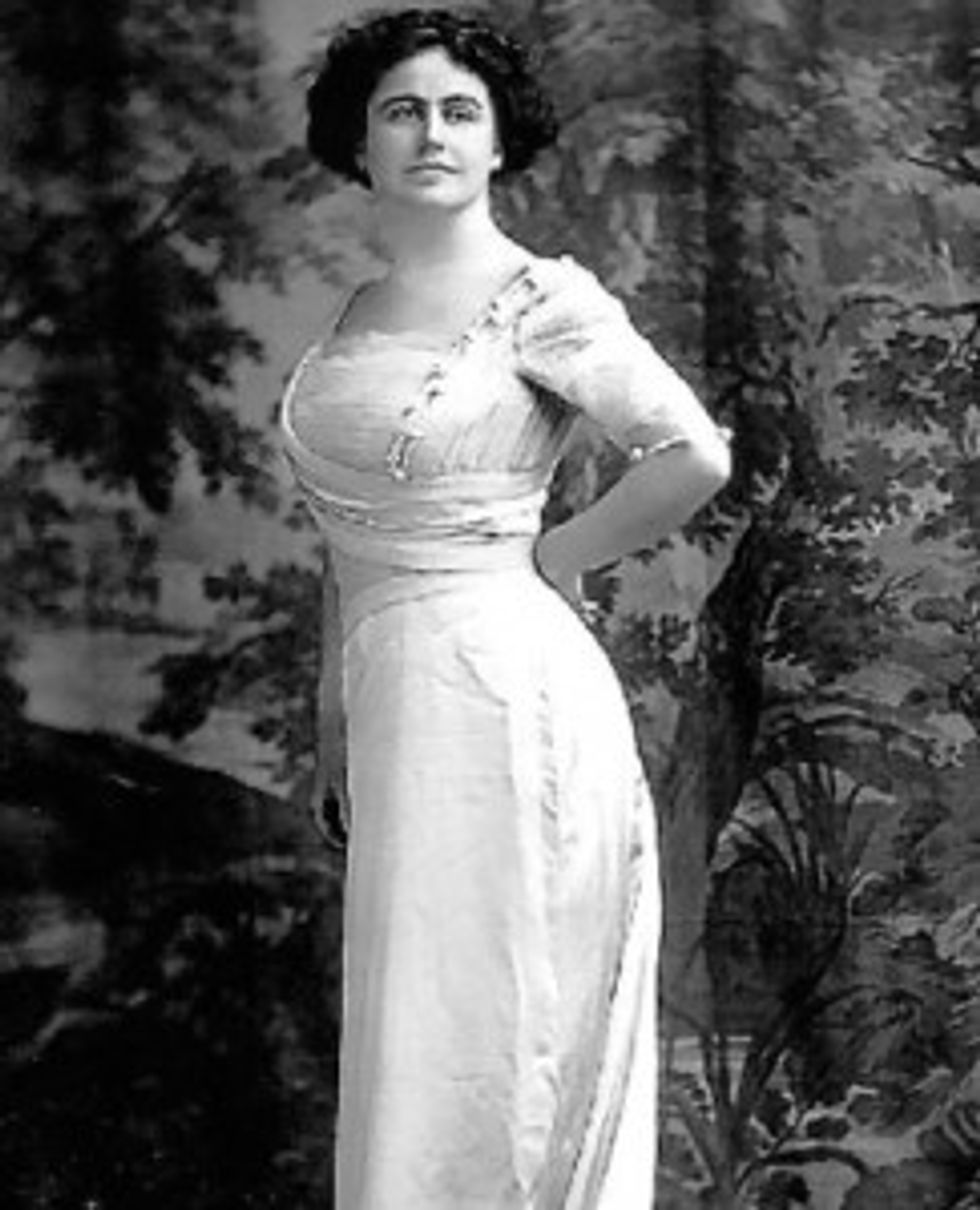Here is the promised second installment of "Five Stories from History that Don't Get Enough Attention." If you didn't read the first story and would like to you can check that out here.
Without further adieu, here are five more stories from history that don't get enough attention.
1. The remarkable Victoria Woodhull and her bid for president

Women in the United States have had to scrape and claw for every last ounce of power that most American men were given from the start. The campaign for women's suffrage was a long one and finally culminated in the 19th Amendment in 1920, a triumph of the democratic process. And yet, America is laughably behind the times as far as women in politics goes. After all, in 2016 Americans chose to elect the human embodiment of a sexually transmitted disease rather than a highly qualified woman in Hillary Clinton.
Still, American women have been involved in politics for longer than we think, even if they had no legal right to do so at the time. In 1872, a 35-year old woman by the name of Victoria Woodhull decided to run for President of the United States on the Equal Rights Party platform. Woodhull was born in 1838 and married her first husband at the age of just 15 and the couple had two children together. Her husband, a Mr. Canning Woodhull, was a drunk and a womanizer and she divorced him but kept his last name. At the time, options for women wishing to divorce their husbands were limited and considered a major social scandal.
Woodhull, along with her sister Tennessee Claflin, first made history in 1870 when the two became the first female stockbrokers in history, even opening up their own firm on Wall Street that same year. They'dlater use the money to start their own newspaper which served primarily to support Woodhull's campaign for president. Scandalous for the time, Woodhull's paper promoted and advocated for birth control, sexual education, women's suffrage, short skirts, spiritualism and licensed prostitution. Famously, Woodhull's paper was the first to publish the English version of Karl Marx's Communist Manifesto and Woodhull was sympathetic to philosopher's ideas.
The experiences of her first marriage led Woodhull to embrace a radical new concept known as Free Love, a policy she campaigned for while running for president. Woodhull wanted women to have as much power over sexual and marital relationships as men of that time, something Victorian Era men, the only demographic who could vote, weren't too keen on. She often referred to the condition of women at the time as "sexual slavery" and demanded that women have full control over their sexual organs and private sexual lives, just as men did. Despite this, Woodhull was adamantly opposed to abortion, largely because she believed that all peoples, even unborn children, deserved the same fundamental rights.
What made her campaign even more astonishing, Woodhull's campaign made history twice before it even started. Not only was she the first women ever to run for president but her vice presidential candidate was the African-American ever to appear on a presidential ticket. Who was it? None other than the great abolitionist Frederick Douglass.
With a women candidate for president and a former slave as her running mate, the Equal Rights Part received less than 0.1 percent of the vote in the 1872 elections. Not surprising considering the prejudices of the time; prejudices that Woodhull herself was not immune to, she was a reported supporter of the pseudoscience eugenics, popular in the United States until the rise and fall of Nazi Germany. Still, Victoria Woodhull's life was a remarkable one, even before her bid for the White House, and it is great shame more people don't know about her. For all her work, she should be one of the heroes of the new rising women's movement in the United States. Safe to say, if Woodhull was alive today she'd be a major proponent of the #MeToo movement.
2. Samuel L. Jackson and the revolution at Morehouse College

He's one of the most famous, and highest grossing, actors in the world, known for a bevy of roles both dramatic and hilarious, but all peppered with his signature colorfulness. Samuel L. Jackson has been a major part of our entertainment consumption for what seems like an eternity and we're all a little better off for it. But long before he was spinning chilling immortal monologues for Quinton Tarantino, fighting Sith Lords as Mace Windu or purging commercial airliners of serpents, Jackson was a student at the Atlanta-based Morehouse College where he was involved in a pretty incredible, yet unreported incident.
Morehouse is a historic African-American all male college known for its liberal arts education. It is the alma mater of the martyred Civil Rights leader, Reverend Dr. Martin Luther King Jr, whose funeral was attended by Jackson, an event that he claims went a long way towards radicalizing his early political views. Jackson says he had grown disillusioned with the idea of civil disobedience and moved towards the Black Power Movement, which saw its ranks balloon following the assassination of King and Civil Rights supporter Robert Kennedy.
In 1969, a year after Dr. King's assassination at the hands of James Earl Ray, a group of Morehouse students including Jackson took the school's board of trustees hostage. Among those held hostage was Martin Luther King Sr., the father of the slain Civil Rights leader. The group demanded changes to the school curriculum as well as the hiring of more black administrators. Morehouse eventually did give into the students' demands but expelled Jackson from the school.Following his expulsion, Jackson says, he was gearing up to take his political activities to an even more extreme level, associating himself with radicals buying weapons and readying for an armed insurrection. By that time, Jackson's mother had received multiple visits from the FBI regarding her son. They had told her that Jackson should leave Atlanta and not return and she took it as a threat against his life.
Jackson and his mother came to believe that if he stayed in Atlanta, he'd be dead in a year and so he left Georgia and moved to Los Angeles. He lived there for two years, working as a social worker while taking a liking to acting. In 1971, he returned to Morehouse as a theater major, his days as a radical revolutionary were over.
This chapter in the life of a film icon is one little noted. Yet, it is one that went a long way in determining his future. Without it, the world may never have known the name Samuel L. Jackson. Worse, they might've known it for all the wrong reasons had he continued down a ever more violent path. It all sounds like it would make a rather exciting movie, doesn't it?
3. The Father of the American Army was a German Mercenary

During the American Revolutionary War, the Continental Army under General George Washington spent the harsh winter of 1778 hunkered down in Valley Forge. Freezing, starving and ill-clothed, Washington saw his army dwindling. In truth, there was nothing resembling an actual army during the early days of Valley Forge. Knowing he needed help, Benjamin Franklin wrote a letter to the Commander-In-Chief introducing him to the man who would forever shape the American armed forces.
Baron Friedrich Wilhelm von Steuben was a Prussian (the main forerunner of modern Germany) military officer who had risen to prominence as a teenager, serving in the General Staff of the Prussian Frederick the Great. In 1763, at the age of 33, von Steuben was discharged for mysterious reasons. Most believe it was because von Steuben was a known homosexual. Von Steuben was eventually forced to leave Prussia altogether and he fled to France where he served as a commander for hire.
While Benjamin Franklin was lobbying the French King Louis XVI for military support, he was informed about von Stueben's availability by the French minister of war and the diplomat passed word to Washington who quickly hired the general. Von Steuben then made his way to Valley Forge.
Baron von Steuben did not speak English but was versed enough in French to use Washington's aide-de-camp and future Secretary of the Treasury, Alexander Hamilton, as well as a soldier named Nathanal Greene as translators. From the moment he arrived, von Steuben began drilling the ragtag rebel army in the tactics he had mastered in Prussia.
Prussian military techniques were the most respected in all of Europe as they produced some of the most skilled fighters in the world. The training emphasized a crushing of individual ego and a building up of group oriented mentality, a practice still utilized by the U.S. military. He also drilled the green Americans in the most efficient methods of reloading and firing rifles and reorganized camp facilities to fit with typical military knowledge.
A notorious stickler for cleanliness, von Steuben introduced basic hygiene to the sloven Patriot encampment. Among these improvements, von Steuben ordered that latrines and kitchens beconstructed on opposite sides of the camp. Before his arrival, the camp didn't even have latrines. The great improvement in hygiene helped improve Patriot morale and maintain the army through the winter. Come Spring, a far better trained American military would be unleashed on the British.
Following his work at Valley Forge, Washington recommended to the Continental Congress that von Steuben be made the army's Inspector General, a request Congress quickly agreed to. In this capacity, von Steuben instituted his rigorous methods on the rest of the Continental Army. Washington would regard him as the instrumental in America's victory over England. Following the war, Baron von Steuben would settle in New York where he was granted a military pension by Congress.
Valley Forge is considered by many to be among the turning points of the American Revolution. It cemented Washington's reputation as a leader, a reputation that would see him gain almost god-like reverence in the United States. Because of Washington's fame, Baron von Steuben's contributions, both at Valley Forge and after, were largely ignored. It didn't help that von Steuben was foreign born, an aristocrat and gay. Though he was well respected in his lifetime, the casual American has never heard of him. His practices and innovations are still utilized by many branches of the military today for which Baron von Steuben, a German, has earned the reputation among military historians as the Father of the American Army. Without him, there may never have been an America at all.
4. If Washington was a king

History is full of countless coincidences and interlocking story lines. The way the events of mankind are so woven together has led to the development of concepts such as the Butterfly Effect and Chaos Theory. In the same way, the armchair historian's favorite pastime is pondering the "what ifs" and, though we may be breaking from real history here, that is exactly what we're exploring now.
Any child in elementary school probably knows the story of colonists wanting to make General George Washington a king following their victory over the English. It is true that there was a faction within the colonies which advocated a coup-d'etat that would oust the Continental Congress and install a monarchy with Washington on the throne. However, no one knows much more than that although the story is a lot more interesting when examined in the "what if" context.
Ignoring the fact that Washington was a humble man who never wanted any position of great governmental power in the first place, let's say this coup actually happened and the Father of America accepted the role of Monarch. While the ramifications of this swift change are tremendous, forthis piece we shall focus on Washington's successors and the curious coincidence that would bring a familiar name to power in this reality.
It is well known that George and Martha Washington had no children. However, Martha had children and grandchildren from her previous marriage. When he died in 1799, Washington's only viable heir was his step-grandson, George Washington Parke Custis was his only heir. In a world where President Washington has become King George I of America, Custis, 18 years old at the time of Washington's death, would have assumed the throne and reigned as King George II. Custis lived a long life and wouldn't die until 1857. Here's where it gets interesting.
By the time he died, Custis had only one surviving child, a daughter named Mary Anna Custis. Because of this Custis' only heir was her husband, his son-in-law, a military man by the name of Robert E. Lee. Yes, that Robert E. Lee, the revered general who fought for the Confederate States of America during the Civil War and whose image still stirs up controversy today. In this strange twist of history, had Washington become King of America, his second successor could very well have been the very man who rebelled against the nation in our timeline.
If we're playing the "what if" game, and I genuinely hope we are, then this coincidence of history is far from the most groundbreaking impacts of turning the bastion of democracy into a hereditary monarchy. But, while every historian knows Lee's family tree crosses with Washington's, there hasn't been much attention paid to this particular line of intrigue. Had Washington been made a king, 19th Century America wouldn't have seen a war against Marsh Robert, but instead would have welcomed the reign of King Robert I.
5. President Edith Wilson

In 1919, in the middle of his second term, President of the United States Woodrow Wilson suffered a severe stroke as a result of serious physical exhaustion. The ordeal left him paralyzed on his left side and almost totally blind. Members of Wilson's staff hid the true extent of his disability from the public, something it is believed a young Franklin Roosevelt, close with the president, took note of.
By early 1920, the public learned of Wilson's true condition and there was great worry about the country's leadership. To maintain his public image and cool fears, the First Lady, the president's second wife Edith, kept him away from prying eyes and assured the world that he was doing well and performing his duties as president. Only this was impossible. The stroke had left Wilson entirely unable to fulfill his responsibilities as president. Had this happened today, Wilson would have been removed from office on the authority of the 25th Amendment and his vice president, Tomas R. Marshall, would have assumed the office. This, of course, this didn't happen and Wilson would finish out his term in 1921 and die three years later.
But between 1919 and 1921 someone had to be running the country and that someone wasn't Marshall.
Instead, many point to Edith as the one who filled his seat in the Oval Office and essentially served as president following her husband's stroke. It was she who kept the president isolated from the rest of the government and it was she who discussed his condition with private doctors who were sworn to secrecy. She refused to allow her husband to resign from office.
During this time. Edith conducted business as the executive, claiming to be doing on her husband's behalf. She met with cabinet members, considered policy and refused to allow anyone to meet with the ailing president, insisting she serve as a middle man between the rest of the federal government and Wilson. This led some to suspect the truth, that it was Edith actually running the country, though they remained quite about it.
While she would deny her alleged presidency all her life, most historians who analyze that period agree she was president in all but name for two whole years, making her the unofficial first female president. Some have criticized her decision to place the reputation of her husband above the country's best interests. Nonetheless, Edith Wilson's time as a pseudo-executive should earn her a place among some of history's greatest feminist heroes. In the end, it may have been her skills at secrecy that kept her true legacy hidden for so long. After all, in 1920, while Edith was assumed to be serving as president, the 19th Amendment was ratified and women finally earned the right to vote. Edith Wilson died in 1961 at the age of 89.



















